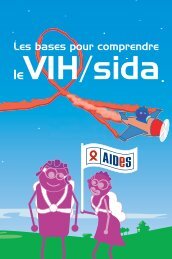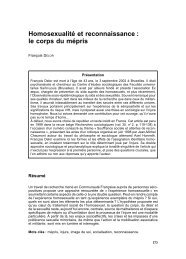Care and support for people living with HIV/AIDS
Care and support for people living with HIV/AIDS
Care and support for people living with HIV/AIDS
Create successful ePaper yourself
Turn your PDF publications into a flip-book with our unique Google optimized e-Paper software.
Waking up to devastationally lose their cattle, thus jeopardizing the food security of the surviving members.But even the poorer male-headed households experience a decrease in livestockwhen a wife dies. In Zimbabwe, the output of communal agriculture (much of it subsistencefarming) has fallen by 50% over the past five years owing largely, thoughnot solely, to the <strong>AIDS</strong> epidemic, according to a report published in 1998. Maizeproduction has seen a decline of 54% of harvested quantity <strong>and</strong> a further drop of61% in marketed output. The number of hectares under cotton has decreased byabout 34% <strong>and</strong> marketed output by a further 47%, <strong>and</strong> the production of groundnuts<strong>and</strong> sunflowers has fallen by 40%. The Southern Africa <strong>AIDS</strong> In<strong>for</strong>mationDissemination Service (SAf<strong>AIDS</strong>), an <strong>AIDS</strong>-related nongovernmental organization inZimbabwe, warned that a food crisis could erupt in Zimbabwe <strong>with</strong>in the next 20years as the group of <strong>people</strong> of productive age shrinks <strong>and</strong> the areas under cultivationdiminish as a result.The bottom line: <strong>HIV</strong> is hurting businessGiven the proportion of adults infected <strong>with</strong> <strong>HIV</strong> <strong>and</strong> dying from associated diseasesin Africa, it is inevitable that the business sector, as well as families, schools<strong>and</strong> other sectors, will feel the cost. Yet many companies (in common <strong>with</strong> manygovernments) have ignored the early warning signs <strong>and</strong> have not acted against <strong>HIV</strong>until sickness <strong>and</strong> deaths become too common to ignore. While experience suggeststhat <strong>HIV</strong> prevention is most effective when it is introduced very early on,be<strong>for</strong>e the virus gets a grip <strong>and</strong> the population of infected <strong>people</strong> becomes uncontrollablylarge, business <strong>people</strong> have taken some persuading. Interviews conductedin engineering <strong>and</strong> construction companies in Gaborone, Botswana, found resistanceto the idea of implementing <strong>HIV</strong> prevention <strong>and</strong> planning measures eventhough 39% of <strong>people</strong> of working age in the city were estimated to be infected in1998.Some companies in Africa have already felt the impact of <strong>HIV</strong> on their bottom line.Managers at one sugar estate in Kenya said they could count the cost of <strong>HIV</strong> infectionin a number of ways: absenteeism (8000 days of labour lost due to sicknessbetween 1995 <strong>and</strong> 1997 alone), lower productivity (a 50% drop in the ratio ofprocessed sugar recovered from raw cane between 1993 <strong>and</strong> 1997) <strong>and</strong> higherovertime costs <strong>for</strong> workers obliged to work longer hours to fill in <strong>for</strong> sick colleagues.Direct cash costs related to <strong>HIV</strong> infection have risen dramatically in this same company:spending on funerals rose fivefold between 1989 <strong>and</strong> 1997, while healthcosts rocketed up by more than 10-fold over the same period, reaching KSh 19.4million (US$ 325 000) in 1997. The company estimated that at least three-quartersof all illness is related to <strong>HIV</strong> infection. Indeed, illness <strong>and</strong> death have jumped fromlast to first place in the list of reasons <strong>for</strong> <strong>people</strong> leaving a company, while old-ageretirement slipped from the leading cause of employee drop-out in the 1980s to just2% by 1997. Figure 12 shows the massive rise in both health spending <strong>and</strong> new<strong>AIDS</strong> cases recorded by another agricultural estate in Kenya.33











